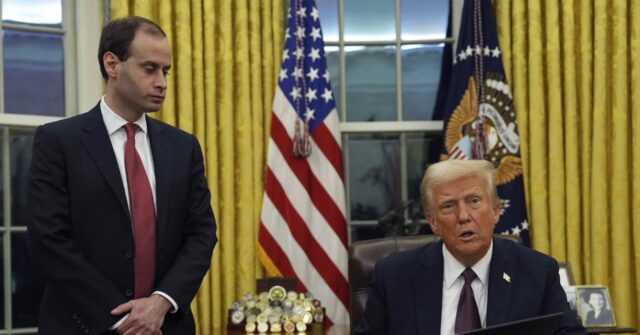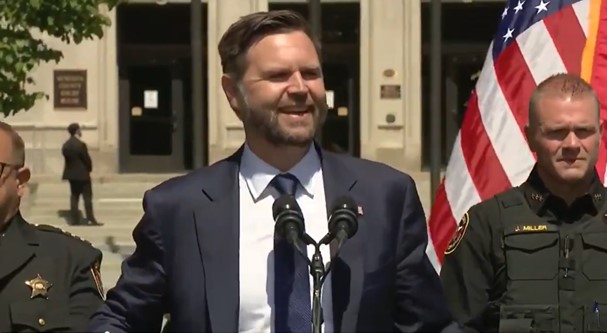President Donald Trump took decisive action on his first day in the Oval Office by signing numerous executive orders, with a significant focus on supporting Israel. These actions align with recommendations from the book, “The Agenda: What Trump Should Do in His First 100 Days”, which suggested over 200 measures for Trump to consider during his initial period in office.
Trump’s executive orders were in close harmony with the proposed blueprint and included several critical directives related to Israel. One of the key orders was the revocation of President Joe Biden’s sanctions on the International Criminal Court. The court is pursuing cases against Israeli Prime Minister Benjamin Netanyahu and former defense minister Yoav Gallant, a move seen by some as unjust. The revocation was outlined on page 37 of “The Agenda”.
National Security at the Forefront
Another significant order involved blocking visas for individuals who support foreign terror organizations. This measure ensures that those entering the United States do not harbor hostile attitudes toward its citizens, culture, government, or institutions. It also aims to prevent the support of designated foreign terrorists or other threats to national security, as discussed on page 25 of “The Agenda”.
Trump also ordered a review and potential pause of foreign aid to ensure that U.S. funding does not go to groups opposing American interests. This includes organizations like the United Nations Relief and Works Agency (UNRWA), which has been linked to terrorism, as noted on pages 33 and 37 of the book.
Further, Trump revoked sanctions imposed by the Biden administration on individuals perceived to support Israeli settlements in Judea and Samaria, known as the West Bank. These sanctions also targeted those with views deemed unfavorable in peace negotiations with the Palestinians. This action was highlighted on page 34 of *The Agenda*.
The orders were meticulously prepared and handed to Trump by Staff Secretary Will Scharf, a Harvard-educated lawyer and former federal prosecutor. Scharf is also one of Trump’s personal attorneys and is known for his active involvement in Jewish and conservative causes.
In addition to the pro-Israel executive orders, Trump made a poignant gesture by bringing former Israeli hostages, including Noa Argamani, and the families of Israeli hostages still held in Gaza, onstage with him at a rally following the Inauguration ceremony. This act underscored the administration’s commitment to addressing these critical issues.
The daring rescue of Argamani and three other hostages by Israeli commandos last June in Gaza was a moment of heroism and tragedy. Israeli police officer Arnon Zamora lost his life in the line of duty during the rescue attempt, highlighting the sacrifices made in the quest for peace and security.
The plight of Israeli hostages, several of whom hold U.S. citizenship, became a central theme for Trump and the Republican Party in the 2024 campaign. This focus reflects a broader commitment to the safety and well-being of both Israeli and American citizens.
Joel B. Pollak, a prominent journalist and author, provides valuable insight into these developments. As the Senior Editor-at-Large at Breitbart News and the host of Breitbart News Sunday on Sirius XM Patriot, Pollak is a respected voice in conservative media. His book, serves as a guide for these early presidential actions and is available for pre-order on Amazon.
Pollak’s work extends beyond mere reporting; he is also the author of *The Trumpian Virtues: The Lessons and Legacy of Donald Trump’s Presidency*, now available on Audible. His contributions to journalism have been recognized with the 2018 Robert Novak Journalism Alumni Fellowship.
Through his writings and broadcasts, Pollak offers a thorough examination of the strategies and decisions that define Trump’s presidency. His analyses provide a comprehensive understanding of the political landscape and the implications of these executive actions.
Trump’s commitment to Israel through these executive orders demonstrates a strong alignment with conservative values and a dedication to strengthening the partnership between the two nations. These actions are a testament to the administration’s resolve to prioritize national security and international alliances.
As the political landscape continues to evolve, the impact of these executive orders and policy decisions will be closely monitored. The focus on Israel and related issues underscores the significance of these early actions in shaping the future of U.S. foreign policy.
The unfolding narrative around these executive orders presents a critical examination of leadership and governance in action. The emphasis on security, partnership, and strategic alliances highlights the administration’s dedication to fostering a secure and prosperous global environment.
The strategic decisions made by Trump and his administration are poised to influence the trajectory of international relations and domestic policy. The emphasis on Israel and the broader Middle East highlights a commitment to peace and stability in a region often fraught with conflict.
As policymakers and analysts assess the impact of these executive orders, the focus remains on ensuring that the actions align with core values and strategic interests. The administration’s approach reflects a dedication to protecting national security and advancing diplomatic efforts.
Through these executive actions, Trump has set a course for his presidency that prioritizes strong alliances and decisive leadership. The emphasis on Israel serves as a cornerstone of this strategy, reinforcing the administration’s commitment to enduring partnerships.
The importance of these early actions cannot be overstated, as they lay the foundation for future policy directions and international collaborations. The focus on Israel and related security issues underscores the administration’s priorities and strategic objectives.
In the coming months, the outcomes of these executive orders will continue to unfold, offering insights into the effectiveness and impact of the administration’s strategies. The emphasis on Israel remains a focal point, reflecting a broader commitment to global stability and security.
The narrative surrounding these executive orders highlights a pivotal moment in U.S. foreign policy, with implications that extend far beyond the immediate actions. The administration’s approach to Israel and related issues serves as a testament to its dedication to fostering a secure and prosperous international environment.


israel where 96% of them are ashkenazis, descended from Japheth, while REAL SEMITES descend from Shem so that 96% of israelis are NOT SEMITES. The bible warned of them, the frauds occupying Palestine are called the “Synagogue of SATAN” in Revelation 2:9 and 3:9. They’re the biggest ANTISEMITES because the Semites live in Palestine, where warmonger netanyahu is KILLING KIDS